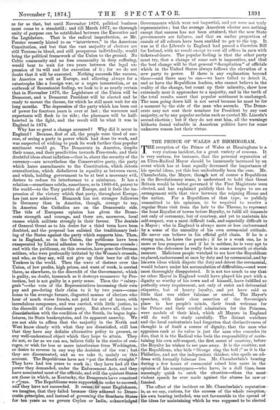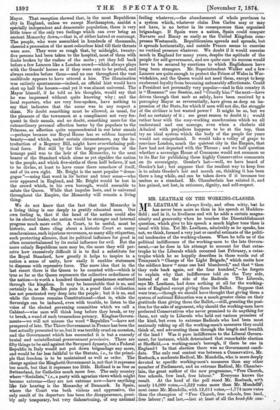THE PRINCE OF WALES AT BIRMINGHAM.
THE reception of the Prince of Wales at Birmingham is a very curious incident, for a great variety of reasons. It is very curious, for instance, that the personal reputation of
an Ultra-Radical Mayor should be immensely increased by an event which has at least equally decreased the importance of his special ideas, yet this has undoubtedly been the case. Mr.
Chamberlain, the Mayor, thongh not of course a Republican in the Revolutionary sense, is understood to hold that Great Britain would be better governed if the First Magistrate were elected, and has explained publicly that ' he hopes to see an arrangement with that view between the reigning House and the nation. For a Republican of that type, so publicly committed to his opinions, to be required to receive a regular State visit from the heir to the Throne, to represent the least Royalist of towns before Royalty, to fulfil all demands not only of ceremony, but of courtesy, and yet to maintain his self-respect, was a most difficult task, and especially difficult to a Mayer; who in England is always more or less embarrassed by a. sense of the unreality of his own ceremonial- attitude. He -never can believe in his official gold chain. If he is a strong man, he hates the parade ; if he is a weak one, he is more or less- pompous ; and if he is neither, he is very apt to express the. deference he really feels in some-uncouth or slavish manner. Malicious people watched to see how the Republioan iloplaced, embarrassed at once by duty and by ceremonial, and by- his own ideas which dispute the duty and detest the ceremonial, would behav-e under his accumulation of difficulties,—and were most thoroughly disappointed. It is not too much to say that no other Mayor in England would have played his part with a dignity so worthy of his town and of himself, have-fulfilled to perfectly every requirement, not only of strict and deferential etiquette, but of hearty loyalty, and yet have said so little that was either fulsome or unreal. The Mayor's speeches, with their clear assertion of the Sovereign's place in her people's minds, their frank welcome for the Prince and their cordial admiration for the Prinoess, were models of their kind, which all Mayors in England will do. well to study carefully. The distant watchers and the-loeal caricaturists had forgotten that distinctiveness of thought is of itself a source of dignity, that the man who appraisea rank at its value is just the man who concedes its due, that it is the Radical who feels the-responsibility of main- taining his own sell-respect, the first secret of courtesy, before the-Royalty he wishes to see pass away. It is the courtier, not the Republican,- who bids "George ring the bell ;" as it is the - Philistine, and not the independent thinker,. who spoils an-ad- dress with formally fulsome lies. Mr. Chamberlain's bearing during a few hours of ceremonial raised him more in the opinion of his countrymen—who have, in a dull time,.-been amusingly quick to catch the situation—than the most' violent speech he ever made against the abuses he saw or fancied.
The effect of the incident on Mr. Chamberlain's reputation-- is-ras we say, curious, for the success of the whole reception, his own bearing included) Was not favourable to the spread of the ideas for maintaining which he was supposed to be elected Mayor. That reception showed that, in the most Republican city in England, unless we except Northampton, amidst a specially independent and democratic population, there is very little trace of the only two feelings which can ever bring an ancient Monarchy down,—that is, of either hatred or contempt. The people, who were assembled in hundreds of thousands, cheered a procession of the most colourless kind till their throats were sore. They were so rough that, by midnight, twenty- five persons had been taken to the hospital, most of them with limbs broken by the rushes of the mobs ; yet they fell back before a few Lancers like a London crowd—which always playa with the Guards' horses as if they were cats to be petted, and always recedes before them—and no one throughout the vast multitude appears to have uttered a hiss. The illumination was entirely spontaneous—indeed, an official hint would have shut up half the houses—and yet it was almost universal. The Mayor himself, if he told us his thoughts, would say that he was impressed without quite knowing why ; and the local reporters, who are very free-spoken, have nothing to say that indicates that the scene was in any respect a sham. No doubt something must be allowed, as usual, for the pleasure of the townsmen at a compliment not very fre- quent in their annals, and no doubt, something more for the extraordinary personal affection borne by the populace to the Princess, an affection quite unprecedented in our later annals —perhaps because our Royal House has so seldom imported beauty—and which, under certain circumstances, say the in- troduction of a Regency Bill, might have overwhelming poli- tical force. But still by far the larger proportion of the homage paid was to the heir of the Monarchy, to the next bearer of the Standard which alone as yet signifies the nation to the people, and which five-sixths of them half believe, if not
to be divine, at least to have come there somehow of itself, and of its own right. Mr. Bridat is the most popular "dema- gogue "—using that word in its better and truer sense—who ever appeared in England, and Mr. Bright would be lost in the crowd which, in his own borough, would assemble to salute the Queen. While that impulse lasts, and is universal throughout the Empire, the Monarchy will remain a living thing.
We do not know that the fact that the Monarchy is a living thing is one deeply to gratify educated men. Our own feeling is, that if the head of the nation could also be its elected leader, the nation would be stronger and internal progress much more swift. A Court, to be useful, must be historic, and there cling about a historic Court so many anachronisms, such injurious reverences, so many silly etiquettes, such protecting silences, that its political influence for good is often counterbalanced by its social influence for evil. But the more calmly Republican men may be, the more they will per- ceive how excessively difficult it is to find a substitute for the Royal Standard, how greatly it helps to inspire in a nation a sense of unity, how easily it enables statesmen to dispense with repressive force. The mere idea that in the last resort there is the Queen to be counted with—which is true so far as the Queen represents the collective orderliness of the nation—is worth a hundred thousand gensdarmes scattered through the kingdom. It may be lamentable that is so, and certainly is, as Mr. Bagehot puts it, a proof that civilisation has not penetrated very deep into the people ; but it is so, and while the throne remains Constitutional—that is, while the Sovereign can be induced, even with trouble, to listen to the voice of the elected governing committee which we call a Cabinet—wise men will think long before they break, or try to break, a wand of such tremendous potency. Kingless Govern- ments—we will not misuse the word "Republics "—have not prospered of late. The Thiers Government in France has been the best actually presented to us, but it was terribly cruel on occasion, and the Government which has succeeded it is but a coarsely brutal and unintellectual gouvernement provisoire. There are fifty things to be said against the Savoyard dynasty, but a Federal Republic in Italy would not put down brigandage any more, and would be far less faithful to the Statuto, i.e., to the princi- ple that freedom is to be maintained as well as order. The charge against the Minghetti Government is, not that it represses too much, but that it represses too little. Iolland is as free as Switzerland, for Catholics much more free. The only country where "Socialists," i.e., a party with agrarian views which might become extreme—they are not extreme now—have anything like fair hearing is the Monarchy of Denmark. In Spain, where the Court was both vicious and oppressive, the only result of its departure has been the disappearance, possi- bly only temporary, but very disheartening, of any national feeling whatever,—the abandonment of whole provinces to a system which, whatever claim Don Carlos may or may not have, is no better in its consequences than organised brigandage. If Spain were a nation, Spain could conquer Navarre and Biscay as easily as the United Kingdom com- presses Westmeath. Republicanism spreads and spreads, but it spreads horizontally, and outside France seems to exercise no vertical pressure whatever. We doubt if it would exercise much in England for many years, despite the aptitude of the people for self-government, and are quite sure its success would have to be secured by exertions to which Englishmen have long been strangers. Mr. Superintendent Walker and a few— - Lancers are quite enough to protect the Prince of Wales in War- wickshire, and the Queen would not need them, except to keep exuberant loyalty from becoming unbearably affectionate. Could a President not personally very popular—and in this country it is "Hosanna!" one Session, and "Crucify him !" the next—have driven through that mob as safely, have been received by a porcupiny Mayor as reverentially, have given as deep an im- pression of the State, for which if men will not die, the struggle of the civiliser is but wasted power ? It might be so, but we feel no certainty of it ; see great reason to doubt it ; would rather bear with the easy-working anachronism which we all understand and can manage, even when a choleric old Admiral with prejudices happens to be at the top, than try an ideal system which the body of the people for years would not comprehend. It would take a volley of grape to convince London, much the quietest city in the Empire, that Law had not departed with the Throne ; and we half question whether a sovereign House of Commons would not summon us to its Bar for publishing these highly Conservative comments on its sovereignty. Gessler's hat—well, we have heard of Gessler's hat ; but suppose that the readiest way to keep free is to salute Gessler's hat and march on, thinking it has been there a long while, and can be taken down if it becomes too useless as a standard. Mr. Chamberlain has saluted it, and has gained, not lost, in reticence, dignity, and self-respect.



































 Previous page
Previous page